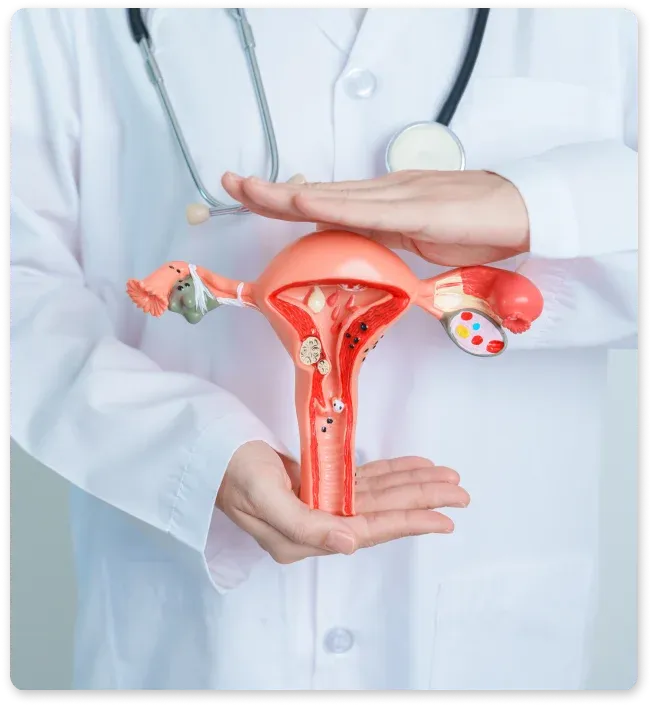
Professional Expertise
Our in-house endocrinologist is ready to help revive your healing journey despite the wide and complex nature of endocrine disorders and dysfunctions.
Polycystic Ovary Syndrome (PCOS)
Introduction
Polycystic Ovary Syndrome (PCOS) is a variety of symptoms caused by a problem with female hormones. It affects the ovaries, the small organs that store a woman's eggs, but it can also affect the rest of the body. PCOS is a prevalent condition in women of childbearing age.In some cases, it can lead to grave health issues if not treated properly.
“This many-sided endocrine disorder affects almost 8-13% of individuals. PCOS impacts women of all races and ethnicities who are of reproductive age.”
https://www.ncbi.nlm.nih.gov/pmc/articles/PMC6266413/
This condition combines symptoms and hormonal imbalances that can significantly impact the patient's overall health and quality of life. R-endocrinology has encountered many patients who have sought guidance on understanding and managing PCOS for years now. In this blog, we’ll explore the key aspects of PCOS, including its symptoms, causes, analysis, and valuable management strategies.
What is PCOS?

First of all, it's essential to know what PCOS is. PCOS is a common and chronic condition that involves hormonal imbalances that affect ovarian function badly. The name "polycystic ovary syndrome" originates from multiple small cysts on the ovaries, as polycystic means many cysts that can be observed during an ultrasound. However, we should keep in mind that not all individuals with PCOS will have these cysts, and the existence of cysts alone does not comprise a diagnosis. Polycystic ovary syndrome (PCOS) can lead to various issues, such as irregular menstrual periods, excessive hair growth, acne, and infertility. Being diagnosed with PCOS are at a higher risk of developing health conditions, including diabetes and high blood pressure. Let's take a closer look at these PCOS symptoms.
Symptoms of PCOS
The symptoms of PCOS can vary widely, but they generally include:
- Irregular Menstrual Cycles: Females with PCOS often experience irregular periods, which can range from very infrequent to absent periods altogether. Some women with PCOS get not more than seven periods a year or none at all. This irregularity can make it difficult to conceive and can also impact overall reproductive health.
- Androgen Excess: Elevated levels of male hormones, or androgens, are commonly associated with PCOS; this can lead to symptoms such as excessive hairs on the face, abdomen, chest, and thighs and male-pattern baldness. The male hormones can make the skin oily and cause breakouts on the face, chest, and upper back. This affects more than 70% of females with PCOS.
- Ovarian Cysts: Small, fluid-filled sacs (cysts) may develop on the ovaries, which can be seen on ultrasound. While these cysts are often harmless, they can exacerbate symptoms like pelvic pain and discomfort.
- Obesity and Insulin Resistance: Many individuals with PCOS experience weight gain, especially around the abdomen. As many as 4 in 5 women with PCOS are obese. It's tough for them to be healthy and manage their weight. Insulin resistance, a condition where the body does not effectively use insulin, is also common in PCOS and can lead to further weight issues and an increased risk of diabetes.
- Darkening of the skin: Dark patches of thickened, velvety, darkened skin can develop in body creases such as the neck, groin, and under the breasts.
- Headaches: PCOS can also trigger headaches in some women.
- Infertility: PCOS can interfere with ovulation, leading to challenges with fertility and difficulties in conceiving.

Causes and Risk Factors
The exact cause of PCOS remains unclear. It is widely acknowledged that this condition develops from a sophisticated interaction of genetic, hormonal, and environmental influences. A few known risk factors include:
- Genetics: PCOS often runs in families, suggesting a genetic predisposition. Suppose a family member like your mother or sister has it. You may also be more likely to have it, and there may be an increased risk of developing the condition.
- Insulin Resistance: Many individuals with PCOS experience insulin resistance, leading to heightened insulin levels in the bloodstream. Excessive insulin levels can result in increased production of androgens by the ovaries, possibly worsening symptoms.
- Inflammation: Low-grade inflammation is also thought to play a role in PCOS. This inflammation definitely contributes to insulin resistance and hormone imbalances.
- Hormonal imbalances: PCOS is linked to high levels of androgens and luteinizing hormone (LH) and low levels of follicle-stimulating hormone (FSH). These imbalances can disrupt normal ovarian function and the menstrual cycle.
Diagnosis of PCOS by R-Endocrinology
There's no single test to specifically diagnose polycystic ovary syndrome (PCOS). Diagnosing PCOS involves a combination of clinical evaluation, laboratory tests, and imaging studies. An R-endocrinology diagnostic criterion typically includes:
- Clinical History and Symptoms: A thorough medical history and evaluation of symptoms are essential. R-endocrinology provides virtual consultations about menstrual cycles, symptoms of excess androgen, and any other relevant health issues.
- Physical Examination: During a physical exam, visible signs of excess hair growth, acne, or other symptoms related to PCOS may be identified.
- Ultrasound: Our expert doctors at R-endocrinology may suggest an ultrasound of the ovaries, which can help identify cysts. However, cysts alone are not sufficient for diagnosis.
- Laboratory Tests: The doctors will also advise Blood tests to measure hormone levels, including androgens, insulin, and glucose. These tests help assess hormonal imbalances and insulin resistance.
- Diagnostic Criteria: Our expert doctor here in R-endocrinology most commonly uses diagnostic criteria, i.e., the Rotterdam criteria, which require at least two of the following three criteria: irregular or absent ovulation, elevated androgen levels and the presence of ovarian cysts on ultrasound.
How do we help you manage PCOS
R-endocrinology offers telemedicine services with two-way communication between patients and doctors. We are available to support patients and help relieve their symptoms. Talk to our medical health professionals to live a healthier life with effective management of PCOS. Here, our expert doctor focuses on alleviating symptoms, addressing underlying issues, and reducing long-term health risks relating to PCOS. Treatment plans are tailored to address the unique symptoms and requirements of each person. Here are some common approaches:
- Diet and Exercise: R-Endocrinology offers personalized virtual consultations that include a balanced diet and regular physical activity to manage weight, improve insulin sensitivity, and alleviate PCOS symptoms. We can discuss and provide a diet plan rich in whole foods, low in refined sugars, and high in fiber.
- Weight Management Plan: Excess weight can lead to hormonal imbalances and irregular periods; even a small weight loss can help improve these issues. Telemedicine consultations will be provided.
- Hair Removal Treatments: We provide continuous support and monitor patients' progress with Topical treatments, Laser Hair Removal, and Electrolysis solutions for excessive hair growth. Patients can securely log their symptoms, and our specialists provide them with the necessary support and adjustments. Moreover, the consultations will track the virtual progress of the symptoms through advanced means. These tools help patients and doctors get the latest results and feedback on personalized treatment.
- Mental Health Support: Virtual counseling sessions and therapy will be provided by R-Endocrinology, which helps to reduce the emotional and psychological impact of PCOS, which should not be overlooked. Virtual therapy can help address issues like anxiety, depression, and self-esteem concerns related to PCOS symptoms.
- Regular Monitoring and Health Screenings: Regular check-ups and follow-ups with a healthcare provider are absolutely vital to effectively monitor the risk of complications, such as diabetes and cardiovascular disease, and we can provide these in the comfort of our homes.
Conclusion
Polycystic Ovary Syndrome is a multifaceted condition with a wide array of symptoms and potential effects on health. Our Endocrinologist aims to help individuals understand their condition and develop a personalized management plan that addresses their unique needs. By focusing on lifestyle changes, appropriate medical treatments, and ongoing support, individuals with PCOS can lead healthy and fulfilling lives. If you think you may have PCOS or have received a diagnosis for the condition, it is important to take action and seek the appropriate medical attention and consult with R-endocrinology to explore the best approach for managing your health and well-being. Your journey towards a managed and healthier lifestyle begins by simply visiting our website and completing the form. Our staff will contact you shortly to schedule a virtual consultation with the doctor from the convenience of your home.
contact us
Get in Touch with us

Make an Appointment
Book Your Online Consultation Now
Manage your endocrine disorders without the hassle of visiting in person. Receive timely consultations without long waiting times and improve your health.



